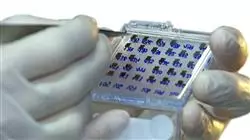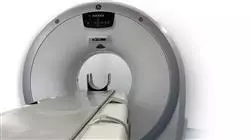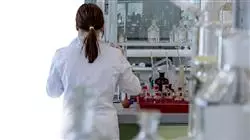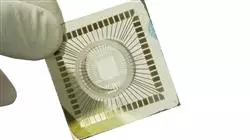University certificate
The world's largest faculty of medicine”
Description
Improve your diagnostic capacity by deepening your knowledge of new biomedical techniques You will become a much more effective and prepared professional”

Biomedicine is revolutionizing clinical processes. Now, it is much simpler and more efficient to perform diagnostics by means of state-of-the-art proprietary tests. For this reason, it is crucial for physicians to keep abreast of these advances, as this is the only way to provide an efficient response to complex patients and pathologies. In this sense, this program is unique because it offers the specialist a fully updated and complete knowledge in this field, preparing them to use high-level tests in the elaboration of their clinical diagnoses.
During the course of the program, the physician will delve into aspects such as Nuclear Medicine, ultrasound medical imaging, image processing, image-guided surgery, robotic vision, deep learning and machine learning applied to medical imaging, applications of medical hardware and software or biosensors, among many other aspects. Thanks to all this, you will acquire a much more complete vision of the field of biomedicine, being able to improve exponentially in your daily clinical practice.
And all this thanks to TECH's 100% online learning system, which will allow doctors to combine their studies with their professional career. In addition, you will benefit from numerous multimedia teaching resources such as procedural videos, interactive summaries, case studies or master classes, always supervised by a teaching staff specialized in this field of medicine.
The future of medicine involves the incorporation of new technologies for the diagnosis and follow-up of numerous patients Don't get left behind and specialize with this 100% online program"
The postgraduate diploma in Diagnostic Engineering and Clinical Follow-Up contains the scientific most complete and up-to-date educational program on the market. The most important features include:
- Practical cases presented by experts in Biomedicine
- The graphic, schematic, and eminently practical contents with which they are created, provide scientific and practical information on the disciplines that are essential for professional practice
- Practical exercises where self-assessment can be used to improve learning
- Its special emphasis on innovative methodologies
- Theoretical lessons, questions to the expert, debate forums on controversial topics, and individual reflection assignments
- Content that is accessible from any fixed or portable device with an Internet connection
Study from the experience of an expert teaching staff and get up to date to incorporate the latest advances in diagnostic biomedicine into your daily practice"
The program’s teaching staff includes professionals from the sector who contribute their work experience to this training program, as well as renowned specialists from leading societies and prestigious universities.
The multimedia content, developed with the latest educational technology, will provide the professional with situated and contextual learning, i.e., a simulated environment that will provide immersive training programmed to train in real situations.
This program is designed around Problem Based Learning, whereby the professional must try to solve the different professional practice situations that arise during the academic year. For this purpose, the student will be assisted by an innovative interactive video system created by renowned and experienced experts.
You will study with the most innovative contents of the current academic landscape, and with the most effective pedagogical resources when it comes to consolidate learning"

Delve into nanotechnology and medical devices and become a specialist in demand by internationally renowned hospitals"
Objectives
Being fully aware that Biomedicine is the future of medical practice, TECH has designed this complete postgraduate diploma that aims to offer the specialist the most updated knowledge in the use of state-of-the-art technology for the diagnosis and monitoring of the patient. Therefore, this program is a great opportunity in the hands of the physician since they will be able to learn in a way that is 100% compatible with their professional activity, at their own pace and by means of highly effective pedagogical tools.

Complete, flexible and tailored to your needs: this postgraduate diploma is the option you were waiting for to update your knowledge in the field of Diagnostic Biomedicine"
General Objectives
- Generate specialized knowledge on the main types of biomedical signals and their uses
- Develop the physical and mathematical knowledge underlying biomedical signals
- Fundamentals of the principles governing signal analysis and processing systems
- Analyze the main applications, trends and lines of research and development in the field of biomedical signals
- Develop expertise in classical mechanics and fluid mechanics
- Analyze the general functioning of the motor system and its biological mechanisms
- Develop models and techniques for the design and prototyping of interfaces based on design methodologies and their evaluation
- Provide the student with critical skills and tools for interface assessment
- Explore the interfaces used in pioneering technology in the biomedical sector
- Analyze the fundamentals of medical imaging acquisition, inferring its social impact
- Develop specialized knowledge about the operation of the different imaging techniques, understanding the physics behind each modality
- Identify the usefulness of each method in relation to its characteristic clinical applications
- Investigate post-processing and management of acquired images
- Use and design biomedical information management systems
- Analyze current digital health applications and design biomedical applications in a hospital setting or clinical center
Specific Objectives
Module 1. Biomedical Images
- Develop specialized knowledge about medical imaging as well as the DICOM standard
- Analyze the radiological technique for medical imaging, clinical applications and aspects influencing the outcome
- Examine the technique of magnetic resonance imaging for medical imaging, clinical applications, and aspects influencing outcome
- Analyze the radiological technique for medical imaging, clinical applications and aspects influencing the outcome
- Evaluate the effect of noise on clinical images as well as different image processing methods
- Present and analyze image segmentation technologies and explain their usefulness
- Gain a deeper understanding of the direct relationship between surgical interventions and imaging techniques
Module 2. Biomedical Technologies: Biodevices and Biosensors
- Generate specialized knowledge in the conception, design, implementation operation of medical devices through the technologies used in this field
- Determine the main technologies for rapid prototyping
- Discover the main fields of application: Diagnostic, therapeutic and supportive
- Establish the different types of biosensors and their use for each diagnostic case
- Deepen the understanding of the physical/electrochemical functioning of the different types of biosensors
- Examine the importance of biosensors in modern medicine
Module 3. Digital Health Applications in Biomedical Engineering
- Analyze the referential framework of digital health applications
- Examine medical image storage and transmission systems
- Evaluate relational database management for digital health applications
- Establish the operation of digital health applications based on web development
- Develop web applications in a hospital or clinical center environment and telemedicine applications
- Analyze applications with the Internet of Medical Things, IoMT and digital health applications with artificial intelligence techniques

This program will help you achieve your professional goals thanks to a wealth of online teaching resources specially designed to facilitate learning”
Postgraduate Diploma in Diagnostic Engineering and Clinical Follow-Up
Biomedical technology is revolutionizing clinical processes, enabling simpler and more efficient diagnoses thanks to state-of-the-art tests. Therefore, it is crucial for physicians to keep up to date with these advances in order to provide effective answers to patients with complex pathologies. Thus, this Postgraduate Diploma in Diagnostic Engineering and Clinical Follow-Up is unique because it provides specialists with up-to-date and comprehensive knowledge in this field, preparing them to use high-level tests in the development of their clinical diagnoses.
Stay on the cutting edge of Biomedical Engineering applications.
During the program, physicians will delve into topics such as Nuclear Medicine, ultrasound medical imaging, image processing, image-guided surgeries, robotic vision or in Deep Learning and Machine Learning applied to medical imaging, among other key points. All this will allow them to acquire a more complete vision of the field of Biomedicine and exponentially improve their daily clinical practice. In addition, this program is taught completely online, allowing doctors to combine their studies with their professional career. Thus, they will have access to numerous multimedia teaching resources, such as videos of procedures, interactive summaries, case studies or master classes. All of this is supervised by a teaching staff specialized in this area of medicine.







